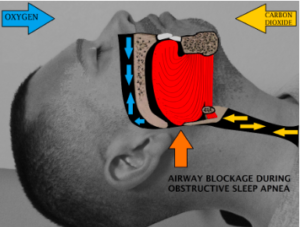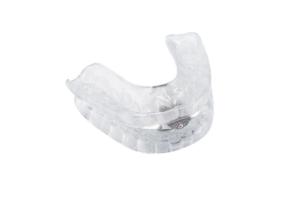Most anti-snoring devices are safe to use and widely available both over the counter and online in many different countries around the world.
Whether you have a partner who snores or you’re a snorer yourself and want to solve the problem, you can choose between mouthguards and chin straps as well as nasal strips and dilators as well as mouth patches.
The good news is that these are relatively low-cost solutions and you don’t need any medical knowledge or understanding to try them out.
Here we look at 5 different types of snoring aids and explore any potential safety concerns that users might need to be aware of.
1. Mouthguard
Mouthguards look a little like a gum shield but that’s where the similarity ends. They are designed to be placed around the teeth and work to bring the lower jaw forward a little and depress the tongue. Doing so hopefully opens the airway at the back of the throat and makes it less likely that you will snore.
There are a couple of different types of mouthguards. The standard is premade and not adjustable. The other is what is called a boil and bite mouthguard – where you put this in boiling water and then bite down on it to make a more comfortable fit in the mouth.
It’s always better to go for the latter when buying a mouthguard. You can also get custom-fit mouthguards through some dentists but these tend to be more expensive.
There are few if any safety issues when using a mouthguard. They fit in the mouth loosely and shouldn’t cause any problems, though some people have complained about a slight gagging sensation during sleep. A few people do suffer from an aching jaw after wearing one all night. They can also be uncomfortable which might have an impact on the quality of your sleep.
A study of patients using mouthguards over an average of 11 years found that there was movement of the teeth through prolonged use. With this type of device, it’s important to weigh up the advantages and disadvantages of use.
2. Chin Strap
The chin strap offers another way to keep the mouth closed during sleep and encourage nasal breathing. It’s usually made from a soft neoprene type of material and can be adjusted depending on your face size and shape. Chin straps tend to work for some people and not others and they are often combined with a mouthguard.
While there are no major issues for a chin strap where health and safety are concerned, it’s important not to use it if you are having trouble with sinuses or congestion. Strapping it too tightly can mean that your mouth is kept firmly closed all night and you don’t breathe properly through the nose.
If you are a mouth breather and your snoring occurs when you are breathing this way, it could be a safe choice to help either reduce the problem or get rid of it completely. Chin straps don’t tend to work that well with patients who have more serious sleep apnoea.
3. Nasal Strip
For most people, the nasal strip is a safe and low-cost way to get more air into the nose and potentially reduce snoring. The narrow canal of the nasal passage can sometimes close off, either exacerbating snoring or causing it directly. The product works by putting a strip with an adhesive backing above your nostrils. This is supposed to widen the nasal passage and improve breathing.
There are no real side effects or potential harm that can be caused by using a nasal strip. The only thing that might be a concern is if you have an allergic reaction to the adhesive on the strip itself.
Nasal strips don’t generally work if you have a more serious underlying condition such as sleep apnoea but if you don’t snore regularly or, for example, snore when you’ve had a drink they are worth a try and perfectly safe.
4. Nasal Dilator
Nasal dilators perform the same function as nasal strips but are applied internally. They usually grip the bottom of the nose and two upward pointing prongs widen the nostrils. They are a good idea if you have trouble with your nostrils closing off during sleep and this is likely to be the main cause of your snoring. In most cases, there are no safety issues with using such devices.
However, a case report in America highlighted the issue of a patient who inhaled a broken-off piece of their dilator and it caused severe pain and swelling. This is an exception to the general rule but is worth noting if you are planning to try nasal dilators – make sure you purchase a properly reviewed product and check it for weaknesses before using it during sleep.
5. Mouth Patch
Mouth patches are a safe and affordable option to try first of all if you or your partner has a problem with snoring. It is a small butterfly-shaped, porous tape that fits over the lips and works to keep the mouth shut so that you breathe mostly through the nose.
As with nasal strips, practically the only health issue might be that you have an allergic reaction to the adhesive on the patch. They are generally safe for the majority of people but it’s a good idea to test against your skin for any reaction before wearing them overnight. You also shouldn’t use mouth patches if you are currently suffering from nasal congestion or have a sinus problem as this may exacerbate the condition and make your night’s sleep uncomfortable.
Snoring Aids and Comfort
One of the key factors in deciding to choose one snoring aid over another is the comfort you get. Different people react in different ways and it’s important to find something that works for you. Mouthguards can be uncomfortable to wear if you are not used to them and they can make good quality sleep difficult to achieve.
Comfort is not necessarily a safety issue but consistent poor sleep can affect you in many different ways. With most of the snoring aids here, you will need to give yourself some time to get used to them.
In general, however, these sleeping aids are perfectly safe and are widely available both online and over the counter by your local pharmacist.







